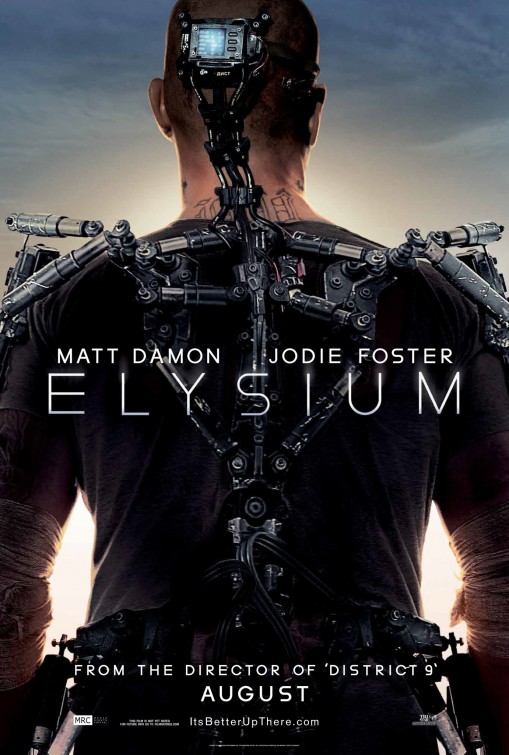What Would You Do To Get There?
Director
Neill Blomkamp
Starring
Matt Damon
Jodie Foster
Alice Braga
Set in the year 2154, Earth is a rotting overpopulated wasteland where crime is rife, life is hard and improvement is nigh on impossible. A select few, however, reside on an orbiting space station named Elysium; a utopia free from disease and hunger. The narrative opens with a brief establishing flashback before detailing the relatively self-serving parolee, Max Da Costa [Damon]. There’s nothing particularly bad about Max, he’s merely a product of his environment. Growing up in an orphanage, he had to resort to stealing cars to make ends meet and wound up in prison for three years. Following that, the totalitarian robotic police force continually hound him as an ex-con, acting as if it’s just a matter of time before he returns to his criminal ways. Lucky enough to be working for minimal wage in a factory, Max is forced to step inside a malfunctioning device and exposed to lethal doses of radiation. With only days to live and well aware that the med-units on Elysium can cure him, Max agrees to a cybernetic upgrade to allow him to kidnap an Elysium citizen and gain access. Simultaneously, the corrupt defence secretary, Jessica Delacourt [Foster] has been arranging a coup with defence contractor John Carlyle [William Fichtner] to reboot the entire system. With this information, Max becomes a lethal target and all of Los Angeles is put on quarantine until he is found.
Despite the critical and commercial success of Blomkamp’s District 9, many audience members complained about the found footage filmmaking style, the rather linear narrative and the simplicity of the lead character. So you’d think by taking on board these points, his second science fiction release, Elysium, would allay some of these complaints. Apparently not. The film hasn’t been out long and already people are whining that it’s too conventional and simplistic in its execution. Is this the case? To a degree but predominantly because the story and setting dictates that it should be. First thing to highlight is that the science fiction genre has an unpleasant habit of accentuating gender stereotypes. The bad guys aren’t just bad, they’re malicious murdering rapists. The hero overcomes obstacles the only way he knows how, with violence yet somehow survives some of the most ludicrous attacks. A woman in a place of high authority is cruel and power-hungry. The female love interest is not only a nurse but also a caring mother. Each role is acted to the level required of said stereotype and no further. It all serves a purpose and has been perpetrated countless times in praiseworthy releases and bottom-of-the-barrel schlock alike.
Second thing to address is the ‘message’ which one could argue was hammered heavily throughout but if you come from a country like South Africa and your success transports you to Los Angeles, wouldn’t you feel the need to make a giant, obvious statement? (Before you get picky, I know he moved to Canada as a child, I’m making a point here) I’m not suggesting we compromise the integrity of film to preach about humanity but sometimes things need to be spelled out. Point in case, the average complaint I overhead as I left the screening was “I thought we’d get to see more of Elysium.” To which, I’m quietly confident the confrontational response should be, “you live in Elysium you dolt, you’re supposed to witness the ravaged populace and feel bad not coo over the shiny spaceship.” And for the more highbrow audience members who have the same complaint but throw out words like “politics,” “corruption” and “societal structures”, it’s a utopian society much like The Hunger Games, the story and characters of interest and note aren’t the ones residing in paradise, they’re the ones mucking it out in the wasteland. Despite all its good intentions, the more you analyse Elysium, the more two dimensional it is. The characters are there to forward the story and the story is there to shout about poverty and class divides. But does this detract from the film as an experience? Not really. And while you could say that these flaws should be more detrimental than I am giving them credit for, ask yourself, how many science fiction films can you think of that are absolutely watertight and without flaws? Science fiction is and always has been a prime location for exploring contemporary societal issues in a crazy, unfamiliar, yet entertaining setting.
Setting all the layering and acting to one side for a second, Elysium is a technical marvel. The cinematography is wonderfully stunning, the production design is so superbly detailed and populated with filth and decay. As odd as this may sound for a movie set and filmed in what is a effectively a landsite for rubbish, it’s a veritable treat for the eyes. If there’s one thing that adds production value to a film, it’s endless detail. Complementing the physical elements are the flawless – absolutely flawless – visual effects. Not only do they feel one hundred per cent real, they manage to fit into the created universe seamlessly. And to top everything off, the primal, organic score by Ryan Amon is specifically impressive on two accounts, first on merit alone and second because this is Amon’s debut.
With a clear message that runs from start to finish, decent performances, lush visuals and an entertaining story, Elysium delivers a more intelligent summer blockbuster. Granted, it’s not perfect and any artist that thinks their work is going to actually change the world is sadly deluded (don’t argue with me on that one) but it’s a fun film. It sets out to present a world and tell a story and does so admirably. Comparisons to District 9 are not only detrimental, they’re utterly pointless, so avoid reviews or conversations that do.
Release Date:
23rd August 2013
The Scene To Look Out For:
Less a scene and more a directorial touch. Both on Earth and Elysium there is a strange sense of borderless unity. Granted, the class divide between those on-planet and those off-world is obvious but the fact that the citizens of Los Angeles skip back-and-forth between English and Spanish while those on Elysium favour English and French (at least, the ones we are shown do). Small thing but a very simple touch that details how the story’s universe has been neatly crafted and honed.
Notable Characters:
Two standout individuals that instantly come to mind is the unrecognisable Sharlto Copley and the fairly unknown but highly energetic Wagner Moura. Copley plays the reprehensible sleeper agent, Kruger. Kruger is your typical wasteland bad guy with his history of violence, creepy dialogue, prolific swearing and general callousness towards the death and suffering of others. But considering this is the same guy who played the fairly simple, endearing Wikus in District 9, it’s quite impressive. Secondly, Moura plays Spider, a smuggler and hacker who organises routine raids on Elysium – where possible – for the infirm. His reasons, while fairly noble, are far from altruistic and his primary function is a gangster. Either way, he’s an interesting character, largely due to the mannerisms and traits of the actor embodying him.
Highlighted Quote:
“What’s in it for the hippo?”
In A Few Words:
“Straightforward in its storytelling and simplistic in its character design but these flaws are easily overlooked when considering the sheer production levels that audiences are treated to”
Total Score: 3/5
![The Red Right Hand Movie Reviews [Matthew Stogdon]](https://reviews.theredrighthand.co.uk/wp-content/uploads/2021/12/cropped-header1.png)




